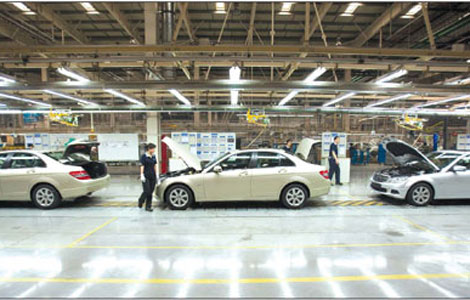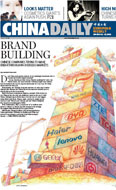Society
Aid offers pour in after Japan quake
Updated: 2011-03-12 00:41
(Agencies)
GENEVA - More than 45 countries were awaiting a request from Tokyo after offering to help Japan deal with a huge earthquake and tsunami, the United Nations said on Friday.
Some 68 search and rescue teams from 45 countries were on standby, but the United Nations was awaiting a green light from authorities in Japan to deploy, said Elisabeth Byrs of the U.N. Office for the Coordination of Humanitarian Affairs (OCHA).
U.S. President Barack Obama spoke to Japanese Prime Minister Naoto Kan to offer to help "in any way possible", the Japanese Jiji agency reported.
In a statement, Obama said: "The United States stands ready to help the Japanese people in this time of great trial ... The friendship and alliance between our two nations is unshakeable, and only strengthens our resolve to stand with the people of Japan as they overcome this tragedy."
In the most concrete instance of immediate help, the U.S. Air Force flew coolant to the Fukushima nuclear plant to help deal with a potentially dangerous breakdown of the cooling system, Secretary of State Hillary Clinton said.
The Russian emergency services agency ERMACOM offered 40 people with three sniffer dogs, while Singapore had civil defence forces on standby and Poland offered firefighters.
China, Switzerland and the United States also offered rescue teams, while Britain, France and others said they were ready to offer whatever help was required.
"The world is shocked and saddened by the images coming out of Japan this morning," U.N. Secretary-General Ban Ki-moon told reporters in New York. "We will do anything and everything we can at this very difficult time."
It was not clear whether Japan would in fact request foreign assistance as its emergency services and civil defence mechanisms are highly developed, according to aid officials in Geneva, the world's humanitarian hub.
Tsunami
The biggest earthquake to hit Japan since records began rocked its northeast coast, triggering a 10-metre tsunami that killed hundreds of people and swept away everything in its path.
The tsunami was initially said by the Red Cross to be higher than some of the Pacific islands that it could hit, but the agency later said that evacuations in many coastal areas in the vast Pacific rim, including the Philippines, had been efficient.
Poorer nations were at greater risk than Japan from the wall of water, though many have beefed up early warning systems and evacuation plans since the 2004 tsunami, the International Federation of Red Cross and Red Crescent Societies said.
"Our biggest concern is the Asia and Pacific region, where developing countries are far more vulnerable to this type of unfolding disaster. The tsunami is a major threat," spokesman Paul Conneally told Reuters in Geneva earlier on Friday.
"At the moment, it is higher than some islands and could go right over them. That is a scenario that nobody wants to see," he said.
Up to 300 bodies were found in the Japanese coastal city of Sendai, Japanese media said. NHK television said the victims appeared to have drowned.
All national Red Cross and Red Crescent Societies in the region were mobilised and evacuating communities, according to the Federation, the world's largest disaster relief network.
The agency said it would take about 24 hours from the time the quake struck for the tsunami danger to pass.
Conneally said that waves hitting the Philippines were smaller than expected at about 80 cm high, and evacuations in the archipelago and other areas had been efficient.
"Authorities in all of these places are warning people not to be complacent, we don't know how it may or may not develop. A lot of evacuations have taken place already in vulnerable coastal areas," he told Reuters.
"These remain red alert areas for us, in terms of our readiness and having volunteers mobilised to provide communities with temporary shelter if needed," he said.
More than 226,000 people died in the 2004 tsunami, which affected 13 Asian countries around the Indian Ocean and led to a huge international aid programme.
E-paper

Factory fever
Despite auto manufacturing bubble scare, car giants gear up expansion of factories.
Dressed for success
Fabric of change
High spirits
Specials

NPC & CPPCC sessions
Lawmakers and political advisers gather in Beijing to discuss major issues.

Panda campaign
Black-and-white bear helps Chengdu in marketing campaign after quake.

High spirits
Domestic liquor boom sparks plans for international 'firewater' expansion.
